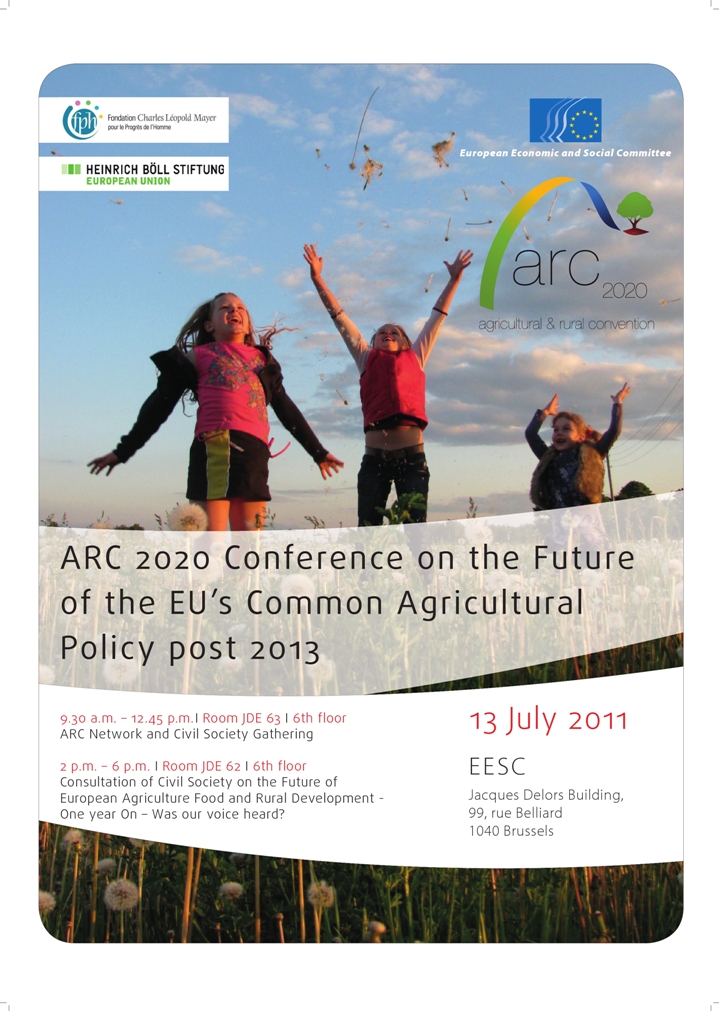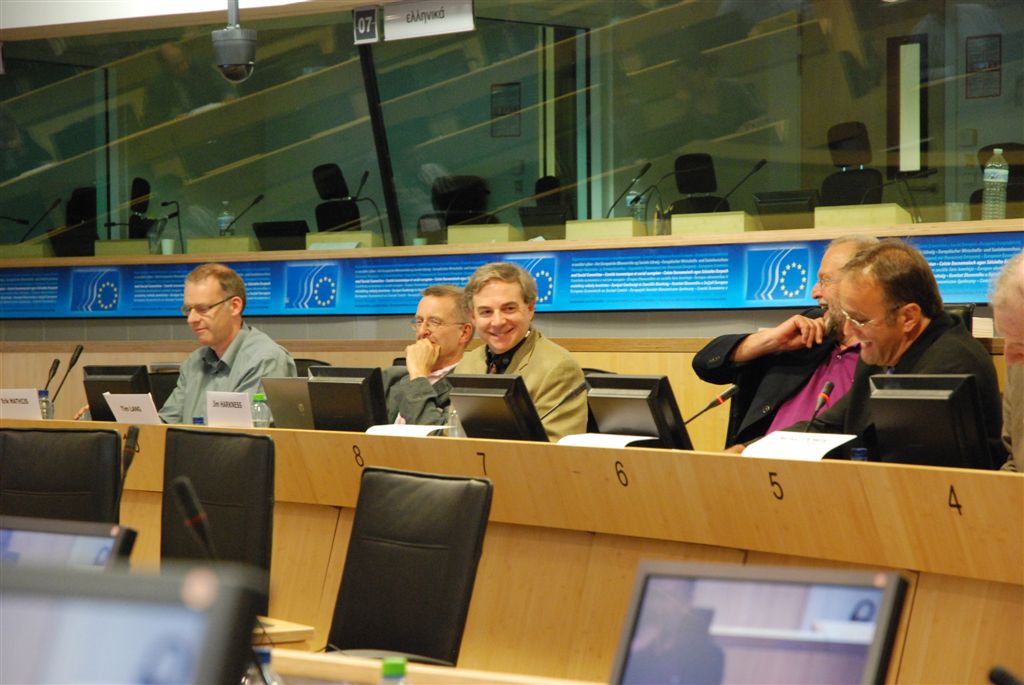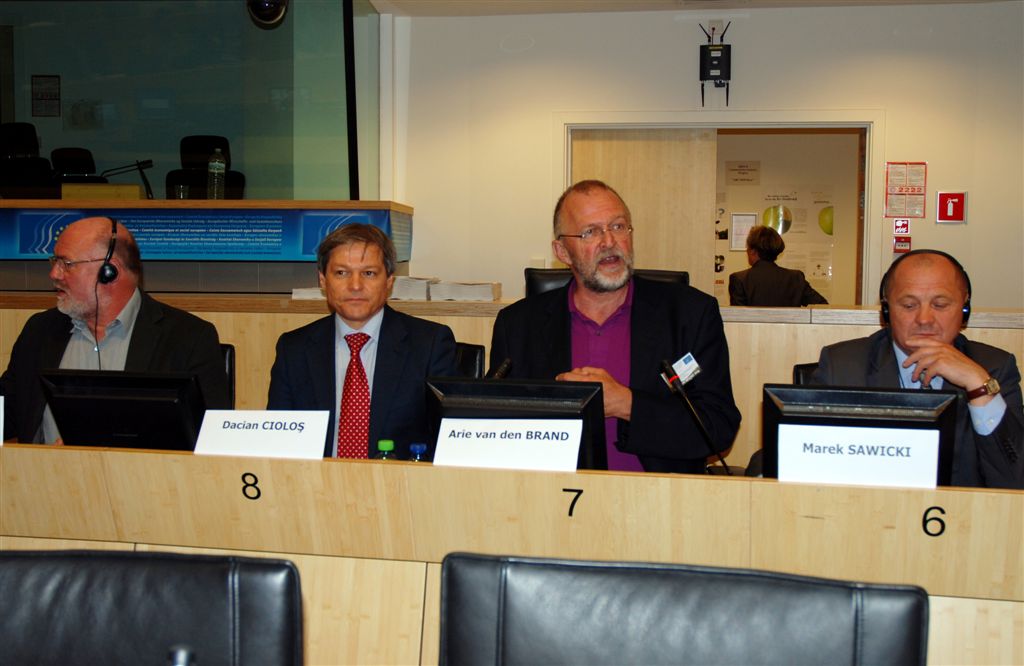The second Agricultural and Rural Convention Conference was held on 13 July 2011, kindly hosted by the European Economic and Social Committee in Brussels. The event was a huge success and helped deliver an important message to key decision-makers in the European institutions.
Click here to listen again to the conference debates
Professor Michael Dower from the ARC Core Group has summarised the main discussions and findings of the afternoon, especially for those who could not attend the conference.

Brussels, 13 July 2011. Two hundred people – from NGOs, government, European Parliament and others – attended ARC’s Second Conference in Brussels on 13 July. Held one year on from the European Commission’s big Conference of July 2010 on the future CAP, this event was our chance to understand how far the ideas that we and others have expressed have been accepted by the European Institutions, and to consider how civil society can best continue to influence that reform over the next year.
The event was in two parts – a morning gathering of ARC network members, to clarify our concerns and our hopes for the future policy; and the main conference in the afternoon, at which we were joined by many others and by a fine team of three invited speakers and then by Agriculture Commissioner Dacian Cioloş and other public figures.
The morning event allowed us to probe a number of themes – market measures; direct payments to farmers; sustainable farming and greening the CAP; public health and agriculture; global food security and fair trade; and rural development. It became clear that the announcements so far made by the Commission and the Parliament, on the future CAP, fall far short of ARC’s aspirations. Also clear is that policies and actions outside the CAP – related for example to health, environment, trade, overseas development, and regional development – must be harmonised and linked to those for agriculture and rural development. We agreed that ARC should continue its activity over the next year, in order to influence the negotiations that will follow the publication in October 2011 of the Commission’s legislative proposals.
The afternoon session began with a presentation by Michael Dower of the conclusions from the morning, in which he repeated ARC’s call for a paradigm shift in agriculture and food systems and a true rural renaissance, and pointed to the issues that are not yet resolved in the Commission’s draft proposals.

Stimulating contributions were then made by three invited expert speakers:
- Jim Harkness, Director of the Institute for Agriculture and Trade Policy, from the USA, sketched the policy challenges and attitudes to agriculture and rural development in the United States, in China and in the broad sweep of developing countries. He affirmed that ARC’s theme of sustainable farming and locally-based rural development is shared by many people in these different international settings, and that we could both contribute to and gain much from exchange of ideas with others around the world.
- Tim Lang, Professor of Food Policy at City University, London, made a passionate plea that we, and others who focus on farming and food, should grasp the crucial link between these issues and health. He endorsed ARC’s call for a paradigm shift from the present global system based on ‘productivism’ to one based on sustainability in the total food supply chain, with far greater attention to the links between food quality, diet and health.
- Erik Mathijs, Professor of Agriculture and Food Economics at Leuven University, outlined the findings of the foresight report, “Sustainable food production and consumption in a resource-constrained world”. He pointed to the dangers of the present productivist paradigm, and outlined the alternative of a ‘sufficiency’ model, which focuses on the true needs for food and the sustainable ways to meet those needs. This second model includes a disciplined approach to the use of non-renewable resources, and a high degree of localism in food chains, so that each nation produces much of the food that its people need, and long-distance transport of food is minimised.
The presentations by Professors Lang and Mathijs can be downloaded here:
A lively discussion followed, with a focus on the challenges that the new paradigm would pose to people, enterprises and politicians, such as changes in lifestyles, in world trade and aid policies, in power relationships within the food chain and much else. Persuading people to accept such changes may demand the use of fiscal, financial and legal signals, education, information, media coverage and hard political debate. The Rio plus 20 Conference in 2012 may provide an opportunity to build a global consensus.

The final session of the Conference was addressed by key representatives of European Institutions. Dacian Cioloş, Commissioner for Agriculture and Rural Development, thanked ARC and others for active input of ideas for the future policy, and said that “the voice of civil society has been heard”. He said that the balance between agriculture and rural development would be retained in the new policy. The support systems for farmers would continue, with equity between member states and between farms of different sizes. There would be simple support for small farms, and for diversified economic activity in rural areas. The LEADER concept would be retained and extended in scope, to be again a trigger for innovation in social and economic action, with clear links between urban and rural areas and between the CAP and other EU funds.
Albert Deß, Rapporteur of the European Parliament’s Agriculture Committee, described the tough negotiations between political parties which led to a consensus in the Parliament, broadly supporting the proposals in the Commission’s Communication of November 2010. He stressed the Parliament’s concern for continuation of CAP funds at the present level; for greening of the farm support system; for simple and effective monitoring, with minimal ‘green tape’; and for continued growth in farm productivity.
Marek Sawicki, Polish Minister of Agriculture and rural development, representing the current EU Presidency, welcomed the role of civil society in the CAP debate. He said that the CAP must be reformed, in order to assure a secure supply of safe food, to raise the average income of farmers and to give them the confidence to invest. There was need for greater equity between countries in the levels of farm support, and increased support for innovation, research and development. Farming must become more energy-efficient, in order to cut carbon emissions. Production of renewable energy offers a significant source of future income for farmers.
Lutz Ribbe, for the European Economic and Social Committee, said that the Committee sees the need for strong measures in the future CAP to address inequities in the distribution of support to farmers; and to increase the ability of farmers to gain a fair return on the costs of production. He urged Commissioner Ciolos to be bold in these respects, and also in greening the farm support system.
The final discussion brought pleas from the floor for:
- lump-sum support, possibly of 2,500 euros per year, to each small farm
- top-up grants to those who manage permanent grasslands
- clear and enhanced environmental standards on farms
- promotion of healthy diets
- support for capacity-building within civil society at local level, and for application of LEADER principles in a widespread and flexible way
- strengthening of partnership between governments and civil society at European, national, regional and sub-regional levels.
In a final response, Commissioner Ciolos defended his proposal for greening of Pillar 1 payments, which should not add significantly to production costs. He accepted the need to encourage healthy diets. He is working on ideas to enhance and widen the LEADER approach, so that it can be an effective trigger for innovation and for social and economic renewal. There may be a special focus on LEADER in new accession countries and in regions which have not yet used LEADER; and a fund, administered from Brussels, to support small innovative projects. The Commissioner urged ARC to continue its work, in order to contribute to the debate which will follow the publication in October of the Commission’s legislative proposals for the future CAP. He said, “Your work is only just beginning: you can help us to turn the new Policy into something tangible when the implementation starts.
More pictures in the gallery:














